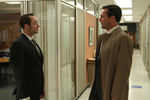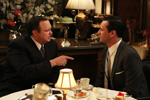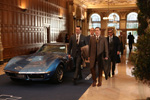Article first published as Mad Men: “For Immediate Release” on Blogcritics.
Mad Men has reawakened its advertising mojo. The focus of this week’s episode is on the “business” of advertising and how it compels the characters to be who they are. Everything develops brilliantly from that point of view. “For Immediate Release” is a  powerful episode with exciting, unexpected, impulsive happenings that set the stage for tantalizingly compelling scenarios for the remainder of Season 6. From an advertising agency perspective this episode has it all. Account resignations and firings, a top-secret new business pitch, a public offering, creative agencies vs. the establishment and an unlikely merger of agencies all happen in rapid succession and converge with a “wow.” Don’s brash and impulsive actions set wheels in motion that spin and turn everyone’s lives inside out. As in other episodes, Detroit automotive accounts, father-in-law clients, emotional partner conflicts, and creative egos all play a role and are beautifully intertwined. Peggy’s episode ending, stunned reaction is the perfect punctuation to one of the best Mad Men episodes yet.
powerful episode with exciting, unexpected, impulsive happenings that set the stage for tantalizingly compelling scenarios for the remainder of Season 6. From an advertising agency perspective this episode has it all. Account resignations and firings, a top-secret new business pitch, a public offering, creative agencies vs. the establishment and an unlikely merger of agencies all happen in rapid succession and converge with a “wow.” Don’s brash and impulsive actions set wheels in motion that spin and turn everyone’s lives inside out. As in other episodes, Detroit automotive accounts, father-in-law clients, emotional partner conflicts, and creative egos all play a role and are beautifully intertwined. Peggy’s episode ending, stunned reaction is the perfect punctuation to one of the best Mad Men episodes yet.
Going Public, Maybe.
Business is good at SCDP, leading some of the partners to think the time is right to make another bold move and explore taking the company public. Without Don or Roger’s knowledge, Bert, Pete, and Joan are quietly meeting with underwriters to assess the  agency’s options and potential valuations. Agency IPO’s did take place in the sixties with some of the most notable being, Wells Rich Greene, PKL, Ogilvy & Mather, and DDB. Today the public agencies are major holding companies like Omnicom, WPP, Publicis, and IPG; and they gobble up smaller agencies before they can take the market plunge. The primary reasons for an agency IPO are enrichment of the principals, financial cushions, and funds for expansion. Along with these benefits come the pressures of financial performance, quarterly reporting rigors, and trepidation that the bean-counters will run roughshod over creative priorities.
agency’s options and potential valuations. Agency IPO’s did take place in the sixties with some of the most notable being, Wells Rich Greene, PKL, Ogilvy & Mather, and DDB. Today the public agencies are major holding companies like Omnicom, WPP, Publicis, and IPG; and they gobble up smaller agencies before they can take the market plunge. The primary reasons for an agency IPO are enrichment of the principals, financial cushions, and funds for expansion. Along with these benefits come the pressures of financial performance, quarterly reporting rigors, and trepidation that the bean-counters will run roughshod over creative priorities.
The SCDP advisor praises the agency’s strong financials and “spotless papers” and informs the partners that there should be an
appetite for an SCDP offering at $9 per share (which was subsequently upped to $11). Pete declares that this would double the size of agency’s capitalization and even Joan would be a millionaire. They toast their looming good fortune and are eager to present the opportunity to Don and Roger. Bert is confident, Pete is elated and Joan is appropriately nervous about Don’s reaction. It is highly unusual to undertake these types of financial discussions without all the partners on board, especially with an “always in control” partner like Don. In the end, this becomes a moot point after the resignation of Jaguar and Pete’s stumbling down the stairs rant against Don’s stupid move on Jaguar.
 Don and Roger are scheduled to have a private dinner with HerbRennet of Jaguar to clear the air. Roger misses the dinner and hops a flight to Detroit in the hopes of getting into a Chevy pitch, and Don is left on his own with Herb and the ladies. This recipe for disaster boils over when Herb suggests letting “a kid who’s been writing flyers for me” look at Don’s work. This is yet another attempt by Herb to steer the agency’s creative output towards deal driven advertising, and it pushes Don over the edge. He resigns the account on the spot and hands Herb a business card with “the name of the guy who’s gonna be handling your account from now on,” and says, “I want you to buy me one last meal. I’m tired of taking it out of your account.” Another impulsive, albeit justified, reaction by Don that has ramifications beyond lost revenue.
Don and Roger are scheduled to have a private dinner with HerbRennet of Jaguar to clear the air. Roger misses the dinner and hops a flight to Detroit in the hopes of getting into a Chevy pitch, and Don is left on his own with Herb and the ladies. This recipe for disaster boils over when Herb suggests letting “a kid who’s been writing flyers for me” look at Don’s work. This is yet another attempt by Herb to steer the agency’s creative output towards deal driven advertising, and it pushes Don over the edge. He resigns the account on the spot and hands Herb a business card with “the name of the guy who’s gonna be handling your account from now on,” and says, “I want you to buy me one last meal. I’m tired of taking it out of your account.” Another impulsive, albeit justified, reaction by Don that has ramifications beyond lost revenue.
Let The Surprises Begin
Surprises and hidden agendas are a mainstay on Mad Men and drive most of the action in “For Immediate Release.” Ken and Pete receive an unexpected call from Jaguar about Don’s dinner (which Pete thought was cancelled) and his resignation of the 
account.Suddenly the plans for a public stock offering are in jeopardy. Pete is livid and his very public confrontation with Don about the implications of the Jaguar loss creates an uproar. Don is surprised to learn (along with the rest of the agency) that his partners were planning a public offering. Then, just as things are ready to explode even more, Roger saunters in with an announcement that he’s gotten the agency into a pitch for Chevy’s new top-secret car. This is the opportunity they have been waiting for and, just as suddenly, the agency’s fortunes are again looking up. The emotions that get unleashed in this convergence of events are intense.
The animosity between Don and Pete escalates, and Joan let’s her frustrations with Don and the price she paid for her Jaguar partnership pour out. Don’s attitude about Jaguar is strictly business. As he tells Pete, “You got to know when it’s over.” Joan sees it as a betrayal and tells Don, “If I could deal with him, you could. I went through all of that for nothing.” Don’s response is that he will fix everything by winning Chevy. This irritates Joan even more and she replies that for once she would like to hear Don say “we” and recognize other people’s contributions and feelings. Ouch! There are a few more surprises yet to come.
Without missing a beat Don assembles the creative team to work onthe Chevy pitch. Don is energized even more when Roger fills  them in on the assignment and the competition. The secret project is code named XP-887 and will be launched to compete against the Ford Mustang. The Chevy briefing describes it as the car of the future designed by computers to be the “perfect car.” A big promise that Don is eager to bring to life. Roger tells the team that the competition is Dancer Fitzgerald & Sample, Campbell Ewald (two large establishment agencies) and CGC. Don describes the field as “two steamships and two rowboats” and seems pleased that he will again be up against Ted Chaough.
them in on the assignment and the competition. The secret project is code named XP-887 and will be launched to compete against the Ford Mustang. The Chevy briefing describes it as the car of the future designed by computers to be the “perfect car.” A big promise that Don is eager to bring to life. Roger tells the team that the competition is Dancer Fitzgerald & Sample, Campbell Ewald (two large establishment agencies) and CGC. Don describes the field as “two steamships and two rowboats” and seems pleased that he will again be up against Ted Chaough.
In reality, Campbell Ewald would appear to have the inside track since it was already a long term GM agency (Don rightly referred to them as “GM’s right arm”) and DFS was also a powerhouse agency. It looks like the XP-877 could in actuality have been the Chevy Vega marketed from 1970 through 1977. Hardly a competitor to the Mustang, the Chevy Vega met with some initial success but is largely regarded as disaster for GM. There was another GM XP-877 that emerged as the 1973 Aero-Jet model of the Corvette. In the midst of all the pitch frenzy SCDP is hit with another unpleasant surprise from Pete’s father-in-law, Tom Vogel, the Vicks client. Vicks fires the agency, thereby further diminishing the possibilities of an IPO. Pete’s chickens have come home to roost.
In the airline lounge on their way to Detroit for the pitch Don and Roger run into a contingent of eight people from DFS in the airline lounge. Word of SCDP’s Vicks account loss has leaked out, and the guys from DFS tease an unaware Roger and Don about it. Joan calls Roger to let him know the Vicks news and Roger wisely decides to keep it from Don so he can stay focused on the task at hand…winning Chevy. Later that night at the hotel bar Ted Chaough runs into Don and is surprised to see that SCDP is in the pitch. What happens next is a wonderfully choreographed commiserative dance of egos and ideas that leads to a bold and brilliant plan to beat “the big guys.”
Don and Ted find themselves behind similar eight balls. Both agencies have just jettisoned existing car accounts to chase a big  payoff long shot with Chevy. Tension is in the air as they play a game of “show me yours and I’ll show you mine” with their respective creative pitches. Ted describes their campaign as being for the young and young at heart, which uses the song “Hit The Road Jack.” Don waxes eloquently about his emotional teaser campaign using music, faces, and the idea of imaging something that’s impossible to imagine to be followed by a dramatic reveal of the car weeks later. They agree that they both have great creative but don’t stand a chance of winning against two top ten agencies. “They’ll just take our creative and give to the big guys,” Ted laments. Don chimes in saying that he’s tired of this crap and that “The business is rigged.” They concoct a dramatic plan to give GM what they want, great creative and scale, by combining the two agencies.
payoff long shot with Chevy. Tension is in the air as they play a game of “show me yours and I’ll show you mine” with their respective creative pitches. Ted describes their campaign as being for the young and young at heart, which uses the song “Hit The Road Jack.” Don waxes eloquently about his emotional teaser campaign using music, faces, and the idea of imaging something that’s impossible to imagine to be followed by a dramatic reveal of the car weeks later. They agree that they both have great creative but don’t stand a chance of winning against two top ten agencies. “They’ll just take our creative and give to the big guys,” Ted laments. Don chimes in saying that he’s tired of this crap and that “The business is rigged.” They concoct a dramatic plan to give GM what they want, great creative and scale, by combining the two agencies.
These types of mergers and combining of resources to win accounts have happened over the years with mixed results and, of course, nothing is ever as simple as it appears on Mad Men. As Roger, Don, Ted, and Jim stride confidently into GM headquarters, Jim Cutler says to the group, “Unless this works I’m against it.” It works. They win. The fun begins.
Merger Or Back To The Future?
Later that night at CGC Peggy pretties herself up and goes into Ted’s office to check on the Chevy pitch. She is taken aback by seeing bothTed and Don in the office. Don tells Peggy that SCDP and CGC have won Chevy together. “They wanted our ideas and a big agency, so we gave them both,” Ted says. Peggy’s first reaction is to let them know she is concerned about what this means for her recent apartment purchase. They reassure her that the merged company will be a larger, more powerful agency… “people, furniture, fixtures, everything.” Ted proudly tells her, “You will now be the copy chief at one of the top 25 agencies”.
 Mergers are an infrequent but normal occurrence among smaller and midsized agencies. Like the merger of SCDP and CGC, they are rooted in well-grounded business decisions and both parties start off with positive intentions. Then the hard realities of the business quickly kick in and difficulties arise. I have been personally involved in navigating and managing a few mergers and acquisitions and know that the road ahead will be difficult. Some of the most important issues to be addressed include reassuring clients of both agencies, defining partner roles, responsibilities and compensation, redistributing equity, eliminating duplicative management, streamlining the combined staff, office space, and of course, the agency’s new name.
Mergers are an infrequent but normal occurrence among smaller and midsized agencies. Like the merger of SCDP and CGC, they are rooted in well-grounded business decisions and both parties start off with positive intentions. Then the hard realities of the business quickly kick in and difficulties arise. I have been personally involved in navigating and managing a few mergers and acquisitions and know that the road ahead will be difficult. Some of the most important issues to be addressed include reassuring clients of both agencies, defining partner roles, responsibilities and compensation, redistributing equity, eliminating duplicative management, streamlining the combined staff, office space, and of course, the agency’s new name.
Each agency has its own culture and style of working and in the end only one culture survives. SCDP and CGC are clearly different in this regard, and it will be fascinating to see how events unfold. Does the new agency need two wisecracking senior account men like Jim Cutler and Roger Sterling? How will they buy out Frank Gleason? Who will be head of accounts? Can Bert still play the elder statesman role? Will the creative styles and egos of Ted and Don coexist or clash? How will Joan be accepted as the only female partner? Will Herb stay on as head of Media? And, of course, there’s Peggy. Will working for Don again overshadow her fantasies about a relationship with Ted?
Ted and Don ask Peggy to write the press release about the merger and to give it to Ted to review. They tell her to “Make it sound like the agency you want to work for.” How will the new agency live up to Peggy’s vision?
